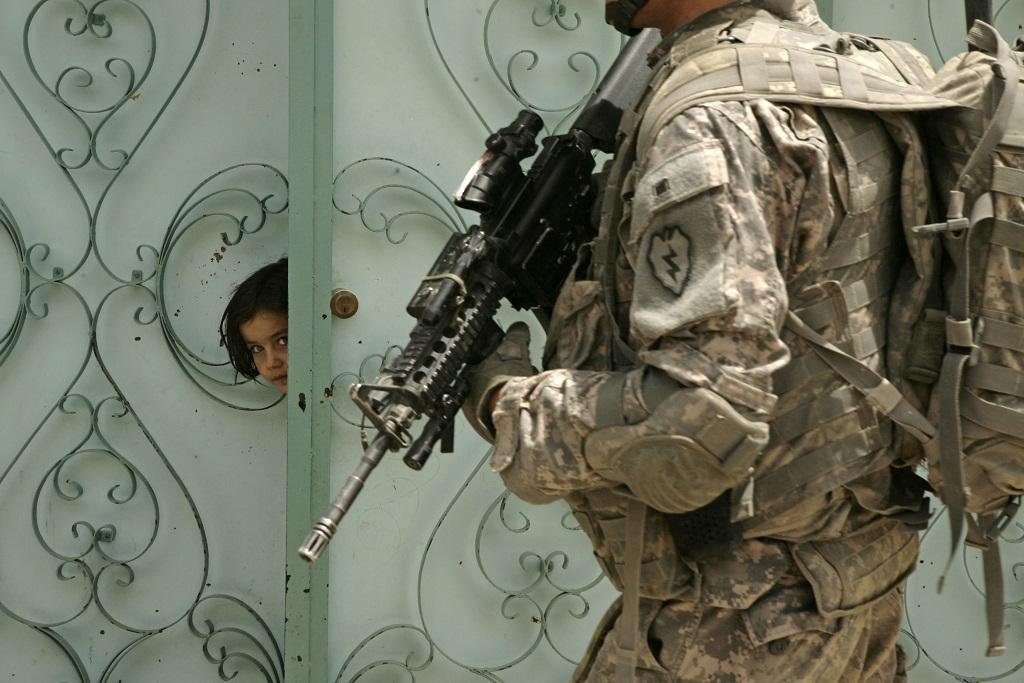Published in American Prospect
Sarah Leah Whitson
Thirty years ago, some classmates and I took a break from our studies at Harvard and set out on a self-appointed mission. We traveled to Iraq to investigate the true devastation caused by the U.S.-led coalition's bombardment. Little did we know that the 1991 war would be remembered as a blip in America's Iraq adventures, now merely called the First Gulf War, to be followed by decades of far greater devastation: 22 years of sanctions and air strikes, a Second Gulf War, military occupation, and what's now just another one of our global endless wars.
Today, the country remains in shambles, and the Iraqi people are left holding the bag. Purveyors of American empire and Iraqi desperation never tire of offering up fresh justifications to give the U.S. just one more go at a fix. But it really is time for the U.S. to step aside, as it's been promising to do for far too long. For those focused on the welfare of the people of Iraq, but still driven, despite the overwhelming evidence of three decades, to seek help from the U.S. government, it's past time to come to terms with the reality that U.S. policies have never helped the Iraqi people.
Once on the ground in Iraq, it wasn't that hard for our group of ten law and public-health students and experts to figure out that claims by military experts that the then-novel "smart bombs" had killed only about 2,000 civilians during the 1991 Iraq war were a snow job. What we discovered was that far from our fighting a "clean war," as the media reported it, not only did the U.S. use hundreds of thousands of land mines, anti-personnel mines, and 24.5 million cluster bombs, it deliberately targeted 17 of 20 electrical generating plants in the country, which the Department of Defense subsequently boasted about as a "dramatic success." These attacks virtually eliminated any ability of the Iraqi national power system to generate or transfer electricity by reducing the generating capacity to less than 300 megawatts (down from a pre-war normal of 9,500 watts). It left Iraqis without the ability to purify and distribute clean water, manage sewage systems, or operate hospitals.
Our investigation revealed that U.S. bombardment of Iraq had caused a massive spiral of infant mortality, primarily due to waterborne diseases caused by the unlawful attacks on Iraq's electrical infrastructure.
Unsurprisingly, the U.S. military responded to our revelations by questioning the validity of our findings. This was before the age of internet and social media–driven citizen journalism that could expose a war's every blow and every fatality. There was no independent journalist on the ground in Baghdad besides a single reporter, Peter Arnett. It was just our word against the U.S. military.
We returned in August 1991, this time with a team of 100 investigators to conduct a series of wide-ranging studies on the impact of the war, including a countrywide, 10,000-household infant mortality study, with findings that were even more shocking: In less than a year, with the compounded effect of sanctions, infant mortality had reached 47,000 excess deaths.
Yet even after Iraq's withdrawal from Kuwait as part of the ceasefire that ended the First Gulf War, U.S. sanctions remained in place, this time with new demands tied to Iraq's destruction of "weapons of mass destruction" and long-range ballistic missiles. Mission creep expanded the U.S. military intervention: The war had morphed from a U.N. Security Council–authorized action to force Iraq's withdrawal, to George H.W. Bush urging the country's Kurdish and Shia communities to rebel and topple Saddam Hussein, leading to new fighting across the country, hundreds of thousands internally displaced, and the eventual establishment of a U.S.-enforced "no-fly zone" over what formally became in 1992 the autonomous Kurdistan Region of Iraq in the country's north.
In 2006, our group, now established as the Center for Economic and Social Rights, returned to Iraq with Lesley Stahl and her 60 Minutes crew in tow, to show them firsthand the devastation that five years of U.S. sanctions were causing Iraqi civilians. The U.N.'s infamously corrupt "Oil-for-Food" scheme, designed to work around the harmful impact of sanctions by allowing Iraq to sell its oil only for food, had been a failure. By then, there were multiple surveys establishing a death toll of up to 500,000 excess child deaths in the country. Stahl questioned then–Secretary of State Madeleine Albright about whether she thought the cost of Iraq's dead children, "more than died in Hiroshima," was worth the price of sanctions, to which she gave her legendary reply: "I think this is a very hard choice, but the price—we think the price is worth it."
Despite the uproar, the sanctions and weapons inspection regime remained in place until the U.S. invasion in 2003. They gave George W. Bush evergreen grounds to accuse Iraq of hiding weapons of mass destruction, replete with phony evidence of "yellowcake" uranium enrichment materials, and served as one of his administration's various justifications for going to war. But this time, the U.S. failed to secure U.N. authorization, and declared it would move against Iraq with a few servile allies, the "coalition of the willing." What the war more truthfully served up was some popular bloodletting in the wake of al-Qaeda's 9/11 attacks on the World Trade Center and Pentagon. Ironically, Osama bin Laden had cited Iraqi infant mortality under sanctions as one of al-Qaeda's justification for the attack.
And so again, our group returned to Iraq, just before the war in January 2003, this time in a bid to bring Nobel Peace Prize laureates Nelson Mandela and Jimmy Carter to the country to negotiate a last-ditch resolution to the conflict. We failed. Instead, Bush pursued the calamity of the U.S. war, with strong bipartisan support, as prominent Democrats fell over themselves to establish their war-hawk credentials: Then-Sen. Joe Biden, chairman of the Senate Foreign Relations Committee, voted for the war, as did then-Sen. Hillary Clinton, with stacked-deck hearings lasting less than two days, engineered by then–Senate Foreign Relations Committee Director Tony Blinken. The war soon became laden with even creepier mission creep than the prior Iraq war: the overthrow of Hussein and calamitous dismantling of Iraqi government institutions, a two-year occupation replete with notorious torture prisons and military contractors run amok, and the installation of a hand-picked Shia-dominated, Iran-influenced government facing ever-emergent Sunni resistance militias. The war and the government system established by the U.S. solidified the notion of the country as split between Sunnis and Shias.
One corrupt and brutal sectarian administration after another tried to quash new uprisings by Iraqis aggrieved by their rule, particularly in the Sunni provinces, bolstered with what became permanent U.S. military forces providing "essential" military support for their survival. The U.S. spent tens of billions more on advisers to new Iraqi governments, providing advice on constitution drafting, governance, and reconstruction, even, of course, rebuilding the electrical plants we destroyed in 1991; estimates of the cost of the war and its aftermath run to $2 trillion. Much if not most of the money was spent in military aid to bolster Iraq's security forces. Even after the formal "withdrawal" of U.S troops in 2011 under President Obama, over 5,000 defense contractors and 20,000 embassy and consulate personnel, all with diplomatic immunity, remained in the country to service over $10 billion in arms deals and "train and advise" Iraqi security forces. The U.S. also continued to determine fateful political outcomes for the country, most disastrously with then–Vice President Joe Biden tipping the scales to ensure Nouri Al-Maliki's re-election as prime minister, despite warning bells that Maliki had become increasingly sectarian, violent, and authoritarian.
Sadly, the post-occupation Iraqi security forces emerged as unjust and brutal as their predecessors, as mountains of human rights reports attest. There was a time when an Iraqi or Kurdish security official would be embarrassed when confronted with evidence of torture, mass executions, massacres, burning of homes, and razing of villages, unfavorably comparing them to the tyrant under whom they themselves had suffered. But with time, the shame faded and only the repression remained. By 2013, following the Maliki government's multiple massacres of Sunni protesters, I warned that a civil war was imminent.
It was in this context that ISIS emerged as a dominant force, promising the people of the Sunni provinces a new, religious government that would preserve their interests as Sunnis, not Iraqis. It was no accident that they were able to gain as much control over such a wide swath of Iraq as they did. This wasn't just about the feebleness of the Iraqi and Kurdish military forces, who literally ran away rather than defend the territory. It was about large numbers of Iraqi Sunnis who could no longer distinguish the good guys from the bad guys, under a decade of Shia-led repression and terror. And it was in this context that the U.S., this time leading a massive, new global coalition, re-emerged to fight again in Iraq, defeating the relatively tiny band of ISIS fighters, of course, but reducing much of Mosul, the ISIS capital, to rubble.
Since the defeat of ISIS, successive Iraqi administrations have barely held control over the country, skilled apparently only in violent suppression of young protesters, Shia and Sunni, who continue to pop up in all parts of the country, fed up with decades of failed governance. Despite its oil wealth, Iraq remains impoverished, with broken health and education systems, once jewels of the Middle East. The country is broken, and there's really no reason to believe it will ever re-emerge as a truly sovereign, stable, and united country.
But still U.S. troops remain, now in endless tit-for-tat attacks with Iran-aligned paramilitary forces that are technically under the control of Iraq's defense ministry but have vowed to keep attacking the U.S. forces until they leave. Our government's justification for maintaining troops in Iraq hasn't even pretended to be about helping the people of Iraq, but "reducing Iranian influence" in the country, demonstrated most recently by our (unlawful) assassination in Baghdad of Iranian Gen. Qassem Soleimani and a group of his Iranian and Iraqi associates in 2020. They have had no definable military objective, but have succeeded in endangering Iraqis, converting their country into an active field of conflict for our proxy war with Iran. They have no significant, practical benefit either; they serve more as a political symbol of U.S. control in Iraq than anything else. Despite the Iraqi parliament's vote last year demanding that U.S. forces leave, it's only this month that the Biden administration agreed in principle to withdraw combat troops from the country, but refused to provide a timetable and insisted that some forces will remain in "training and advisory" roles.
President Biden should acknowledge that past and present performance should be a good indicator of future results. The best thing the U.S. can do now is withdraw its remaining troops and end its support for sectarian parties that continue to keep the country divided and dysfunctional. Iraqi youth have spoken: They reject the control of any foreign state, Iranian or American. We should accede to their demands and get out of the way. We've done enough harm already.


